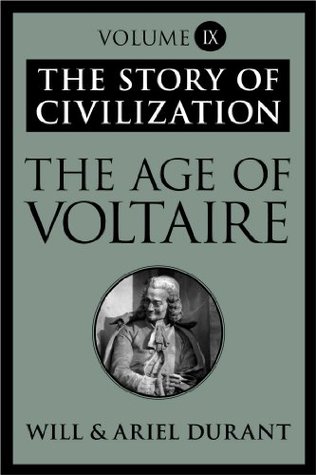More on this book
Kindle Notes & Highlights
by
Will Durant
Read between
September 26 - October 11, 2019
A German jurist thought that the increase in northern Europe was largely due to the transfer of monks and nuns from celibacy to parentage by the Protestant Reformation, and urged that “a statue be erected to Luther as the preserver of the species”;36 but we must not exaggerate the continence of medieval monks.
Wei liked this
Marriages were entered upon in heat, and broken in thaw;
“Everybody in this society,” Congreve had written in 1700, “was born with budding antlers”;
“a nation lighted up at both ends must soon be consumed.”
“don’t talk to me about books. The only books I know are men and cards.”
The Earl of Chesterfield, who loved the town, would doubtless have applied to its elite the description that he gave of all courts, as places where “you must expect to meet with connections without friendship, enmities without hatred, honor without virtue, appearances saved and realities sacrificed; good manners with bad morals; and all vice and virtues so disguised that whoever has only reasoned upon both would know neither when he first met them at court.”
Wei liked this
The high birth rate favored by the Catholic Church, as her secret weapon against all opposition, soon countervailed the depredations of famine, pestilence, and war;
In the long run the faith and fertility of the oppressed overcame the arms and greed of the conquerors.
Ambition was the mast of his character and the wind in his sails;
All things flow, and certainty is a dream.
“We tend to give the name of virtue to any quality in others that gives us pleasure by making for our advantage, and to give the name of vice to any human quality that gives us pain.”
Wei and 1 other person liked this
He maliciously suggests that the world was only the first rude essay of some infant deity, who afterwards abandoned it, ashamed of his lame performance; … or it is the production of old age and dotage in some superannuated deity, and, ever since his death, has run on at adventure, from the first impulse and active force which it received from him.
Wei liked this
In these monotheistic creeds—Judaism, Christianity, Mohammedanism—merit and “salvation” were more and more divorced from virtue and attached to ritual observance and unquestioning belief.
Wei and 1 other person liked this
He returned to Edinburgh July 4, 1776, prepared to die “as fast as my enemies, if I have any, could wish, and as easily and cheerfully as my best friends could desire.”
This poverty was due not so much to the tightness of booksellers and the indifference of Walpole as to the unprecedented glutting of the literary market by mediocre talents underselling one another. The predominance of failures over successes in the “word business” shared with the divorce of literature from aristocratic patronage in debasing the social status of authors.
Wei liked this
As yet a child, nor yet a fool to fame, I lisp’d in numbers, for the numbers came.4
A little learning is a dangerous thing; Drink deep, or taste not the Pierian spring5
Wei and 1 other person liked this
“A pretty poem, Mr. Pope, but you must not call it Homer.”
He described himself as “a lively little creature, with long legs and arms; a spider is no ill emblem of him; he has been taken at a distance for a small windmill.”
Lord Bathurst said of him that he had headaches four days a week, and was sick the other three.
“Gray has a kind of strutting dignity, and is tall by walking on tiptoe.… I confess that I contemplate his poetry with less satisfaction than his life.”
fig leaves are as necessary for our minds as our bodies, and ’tis as indecent to show all we think as all we have.
Richardson was so intent on preaching that he allowed some flaws into his literary art.
He knew the body of his country’s life better than its soul, and the body of love better than its spirit; the more delicate and subtle elements of the English character escaped him. Even so, he left his mark upon Smollett, Sterne, Dickens, and Thackeray; he was the father of them all.
So he described Sir Charles Knowles as “an admiral without conduct, an engineer without knowledge, an officer without resolution, and a man without veracity.”
“a nation fond of their liberty, learned, witty, despising life and death, a nation of philosophers.”
Wei and 1 other person liked this
“Every year,” said de Tocqueville, “the inequality of taxation separated classes, … sparing the rich and burdening the poor.”
“Sire, my clergy’s vices are their own; mine come from my ancestry.”
“We will never consent that that which has heretofore been the gift of our love and respect should become the tribute of our obedience.”
The power of the Church rested ultimately on the success of the parish priest.
Monks, friars, and nuns were diminishing in number and growing in virtue26 and wealth.


